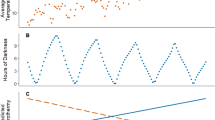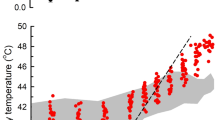Abstract
The pineal complex of lizards is comprised of an extracranial photoreceptive structure known as the parietal eye, and an intracranial pineal organ which is homologous to the pineal gland of birds and mammals. Studies have shown that removing the parietal eye1,2 or severing the parietal nerve3 causes lizards to select higher temperatures when allowed to thermoregulate behaviourally in thermal or photothermal laboratory gradients. Although comparable studies involving removal of the lizard pineal organ have not previously been attempted, field data indicate that pinealectomy may have an antagonistic effect to parietalectomy4. We present evidence here which shows that (1) following pinealectomy, collared lizards (Crotaphytus collaris) behaviourally select or prefer lower temperatures than their controls in thermal laboratory gradients, and (2) the effect of surgical treatment is independent of the effects of a behavioural fever-inducing substance5 which elevates by a fixed amount the environmental temperatures selected.
This is a preview of subscription content, access via your institution
Access options
Subscribe to this journal
Receive 51 print issues and online access
$199.00 per year
only $3.90 per issue
Buy this article
- Purchase on Springer Link
- Instant access to full article PDF
Prices may be subject to local taxes which are calculated during checkout
Similar content being viewed by others
References
Hutchinson, V. H. & Kosh, R. J. Oecologia 16, 173–177 (1974).
Roth, J. J. & Ralph, C. L. J. exp. Zool. 198, 17–28 (1976).
Engbretson, G. A. & Hutchison, V. H. J. exp. Zool. 198, 29–38 (1976).
Stebbins, R. C. Copeia 1960, 276–283 (1960).
Vaughn, L. K., Bernheim, H. A. & Kluger, M. J. Nature 252, 473–474 (1974).
Barber, B. J. & Crawford, E. C. Jr, Physiol. Zool. 52, 250–263 (1979).
Binkley, S., Kluth, E. & Menaker, M. Science 174, 311–314 (1971).
Cogburn, L. A., Harrison, P. C. & Brown, D. E. Proc. Soc. exp. Biol. Med. 153, 197–201 (1976).
Spencer, F., Shirer, H. W. & Yochim, J. M. Am. J. Physiol. 231, 355–360 (1976).
John, T. M., Itoh, S. & George, J. C. Horm. Res. 9, 41–56 (1978).
Hammel, H. T. A. Rev. Physiol. 30, 641–710 (1968).
Crawshaw, L. I. & Hammel, H. T. in The Pharmacology of Thermoregulation (eds Schonbaum, E. & Lomax, P.) 142–145 (Karger, Basel, 1973).
Hammel, H. T., Crawshaw, L. I. & Cabanac, H. P. in The Pharmacology of Thermoregulation (eds Schonbaum, E. & Lomax, P.) 124–141 (Karger, Basel, 1973).
Ralph, C. L., Firth, B. T. & Turner, J. S. Am. Zool. 19, 273–293 (1979).
Berk, M. L. & Heath, J. E. J. therm. Biol. 1, 65–78 (1975).
Kluger, M. Fedn Proc. 38, 30–34 (1979).
Author information
Authors and Affiliations
Rights and permissions
About this article
Cite this article
Firth, B., Ralph, C. & Boardman, T. Independent effects of the pineal and a bacterial pyrogen in behavioural thermoregulation in lizards. Nature 285, 399–400 (1980). https://doi.org/10.1038/285399a0
Received:
Accepted:
Issue Date:
DOI: https://doi.org/10.1038/285399a0
This article is cited by
-
Thermoregulation in captive broad-snouted caiman (Caiman latirostris)
Zoological Studies (2014)
-
A review of the physiology of fever in birds
Journal of Comparative Physiology B (2013)
-
A role for natriuretic peptide in lipopolysaccharide-induced fever in Pekin ducks (Anas platyrhynchos): is natriuretic peptide an endogenous antipyretic in birds?
Journal of Comparative Physiology B (2009)
-
Dietary fats, selected body temperature and tissue fatty acid composition of agamid lizards (Amphibolurus nuchalis)
Journal of Comparative Physiology B (1994)
-
Thermoregulatory behaviour in two species of iguanid lizards (Crotaphytus collaris andSauromalus obesus): diel variation and the effect of pinealectomy
Journal of Comparative Physiology B (1989)
Comments
By submitting a comment you agree to abide by our Terms and Community Guidelines. If you find something abusive or that does not comply with our terms or guidelines please flag it as inappropriate.



